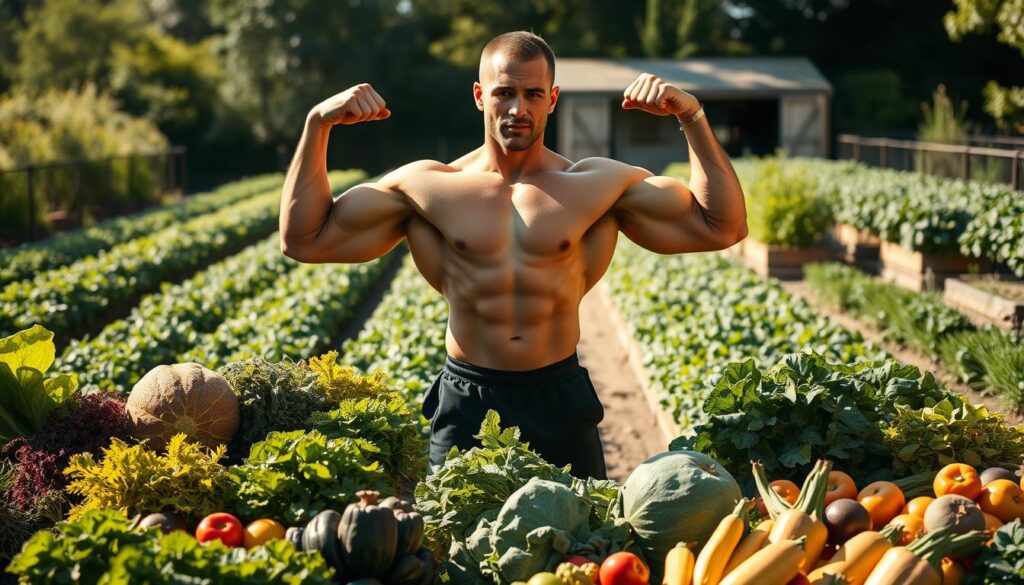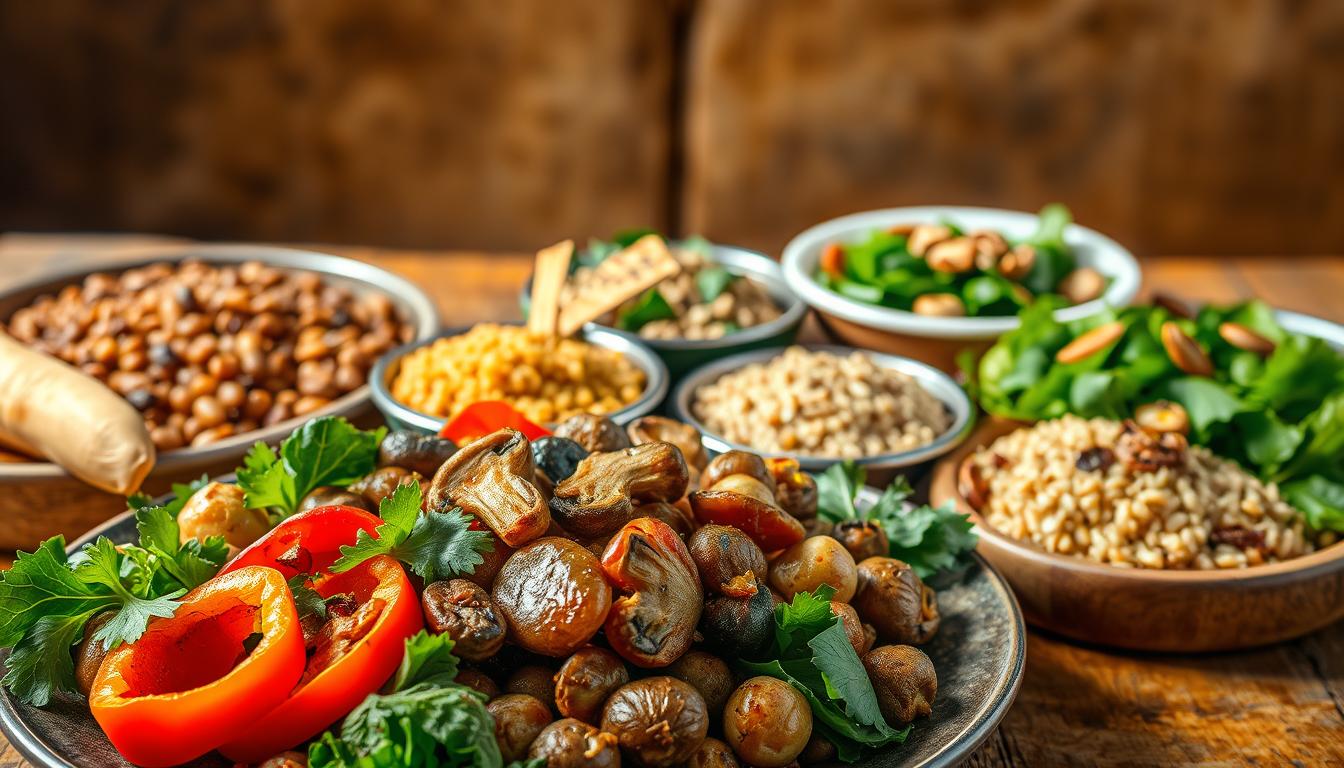As the renowned nutritionist, Dr. Michael Greger, once said, “The key to a healthy diet is not just a matter of what you eat, but also how much you eat.” For individuals looking to build muscle on a plant-based diet, a well-planned vegetarian bulking meal plan is crucial.
Building muscle requires a strategic approach to nutrition, ensuring you consume sufficient protein and calories to support muscle growth. A vegetarian meal plan can be tailored to meet these needs, providing the necessary nutrients for muscle development.
A well-structured vegetarian bulking meal plan for beginners can help individuals new to plant-based muscle building get started on their fitness journey.
Key Takeaways
- Importance of a well-planned vegetarian diet for muscle building
- Necessity of sufficient protein and calorie intake
- Benefits of a tailored vegetarian meal plan
- Support for muscle growth and development
- Guidance for beginners on a plant-based diet
Understanding Vegetarian Bulking
Vegetarian bulking is a nuanced process that involves understanding the right balance of nutrients for muscle growth. Bulking, in general, refers to the process of consuming more calories than one burns to gain weight, primarily in the form of muscle mass. For vegetarians, this requires careful planning to ensure that the diet is rich in proteins, complex carbohydrates, and healthy fats.

What Is Bulking and Why It Works for Vegetarians
Bulking is a dietary strategy used to gain muscle mass by being in a calorie surplus. It works for vegetarians because, with proper planning, a vegetarian diet can provide all the necessary nutrients for muscle growth. Plant-based protein sources like legumes, tofu, and tempeh are crucial for muscle repair and growth.
The key to successful bulking on a vegetarian diet is to consume a variety of foods that are high in protein, complex carbohydrates, and healthy fats. This includes:
- Legumes such as lentils and chickpeas
- Nuts and seeds like almonds and chia seeds
- Whole grains including brown rice and quinoa
- Vegetarian protein powders like pea and hemp protein
Benefits of Plant-Based Muscle Building
Building muscle on a plant-based diet has several benefits, including reduced risk of chronic diseases like heart disease and diabetes. A well-planned vegetarian bulking diet is typically high in fiber, vitamins, and minerals, and low in saturated fats.
Some of the key benefits of plant-based muscle building include:
- Improved overall health due to high intake of fruits and vegetables
- Lower risk of certain cancers associated with a diet high in animal products
- Enhanced recovery due to the anti-inflammatory effects of many plant-based foods
Essential Nutrients for Vegetarian Muscle Building
To bulk up on a vegetarian diet, it’s crucial to understand the key nutrients that support muscle growth. A well-planned vegetarian diet can provide all the necessary nutrients for effective muscle building. This involves focusing on the right balance of protein, carbohydrates, and fats, as well as critical micronutrients.
Protein Requirements and Top Vegetarian Sources
Protein is a fundamental nutrient for muscle building. Vegetarian athletes need to consume sufficient protein from plant-based sources. The recommended daily protein intake varies based on factors such as age, weight, and activity level. Generally, for muscle building, the intake should be around 1.2 to 1.6 grams of protein per kilogram of body weight.
Some of the top vegetarian protein sources include:
- Legumes (lentils, chickpeas, black beans)
- Nuts and seeds (almonds, chia seeds, hemp seeds)
- Whole grains (quinoa, brown rice)
- Soy products (tofu, tempeh)
Examples of high protein vegetarian meals include lentil soup with quinoa, chickpea salad with almonds, and tofu stir-fry with brown rice.
| Food | Protein Content per Serving |
|---|---|
| Lentils | 18g per 1 cup cooked |
| Chickpeas | 15g per 1 cup cooked |
| Tofu | 20g per 3 oz serving |
Carbohydrates and Fats for Energy and Recovery
Carbohydrates are vital for providing energy during workouts, while fats are essential for hormone production and overall health. Vegetarian athletes should focus on complex carbohydrates such as whole grains, fruits, and vegetables, and healthy fats like nuts, seeds, and avocados.
Critical Micronutrients for Vegetarian Athletes
Vegetarian athletes need to pay special attention to certain micronutrients that are crucial for muscle function and overall health. These include:
- Iron: found in legumes, dark leafy greens, and fortified cereals
- Calcium: found in fortified plant milk, dark leafy greens, and tofu
- Vitamin B12: found in fortified plant milk, cereals, and nutritional yeast
Ensuring adequate intake of these micronutrients is vital for plant-based bulking and overall athletic performance.
Vegetarian Bulking Meal Plan for Beginners
A well-structured vegetarian bulking meal plan is crucial for beginners looking to increase their muscle mass without consuming animal products. This meal plan will guide you through the essential nutrients and food choices necessary for effective bulking.
Breakfast Options
Starting your day with the right nutrients is vital for muscle growth and energy. Breakfast options should be high in protein and complex carbohydrates.
High-Protein Morning Meals
Begin with high-protein breakfasts like tofu scrambles with spinach and whole-grain toast, or a bowl of oatmeal with almond butter and banana. These meals provide the necessary protein to kickstart muscle repair and growth.
Pre-Workout Breakfast Ideas
For a pre-workout boost, consider a smoothie bowl with protein powder, berries, and granola, or whole-grain waffles with almond butter and banana slices. These meals offer sustained energy and support muscle function during your workout.
Lunch Recipes
Lunch is an opportunity to refuel and continue supporting muscle growth. Opt for meals that are both protein-rich and complex in carbohydrates.
Protein-Packed Midday Meals
Choose meals like lentil soup with quinoa and vegetables, or a chickpea salad with avocado and brown rice. These options are not only high in protein but also rich in fiber and essential vitamins.
Quick and Easy Options
For busy days, consider a hummus and vegetable wrap with whole-grain tortilla, or a bowl of whole-grain pasta with marinara sauce, roasted vegetables, and tofu. These meals are quick, nutritious, and support your bulking goals.
Dinner Suggestions
Dinner is a critical meal for recovery and muscle growth. Focus on nutrient-dense foods that are high in protein and complex carbohydrates.
Hearty Evening Meals
Opt for meals like vegetable stir-fry with tofu and brown rice, or a hearty lentil curry with whole-grain naan. These dinners are not only satisfying but also provide the necessary nutrients for muscle recovery and growth.
Recovery-Focused Dinners
After a workout, a recovery-focused dinner might include a protein-rich meal like tempeh with roasted sweet potatoes and steamed broccoli. This combination supports muscle repair and replenishes energy stores.
Snacks and Supplements
In addition to main meals, incorporating the right snacks and supplements can further support your bulking goals. Choose snacks that are nutrient-dense and complement your meal plan.
Some beneficial snacks include nuts and seeds, dried fruits, and energy bars made from wholesome ingredients. For supplements, consider plant-based protein powders, creatine, and branched-chain amino acids (BCAAs) to support muscle growth and recovery.
Sample 7-Day Meal Plan
Here’s a sample 7-day meal plan to get you started:
- Monday: Breakfast – Oatmeal with banana; Lunch – Lentil soup; Dinner – Tofu stir-fry
- Tuesday: Breakfast – Smoothie bowl; Lunch – Chickpea salad; Dinner – Vegetable curry
- Wednesday: Breakfast – Whole-grain waffles; Lunch – Hummus wrap; Dinner – Tempeh with sweet potatoes
- Thursday: Breakfast – Tofu scramble; Lunch – Quinoa salad; Dinner – Lentil curry
- Friday: Breakfast – Protein smoothie; Lunch – Whole-grain pasta; Dinner – Grilled tofu with vegetables
- Saturday: Breakfast – Avocado toast; Lunch – Chickpea and avocado salad; Dinner – Vegetable stir-fry
- Sunday: Breakfast – Breakfast burrito; Lunch – Lentil soup; Dinner – Tofu with roasted vegetables
This meal plan provides a balanced mix of protein, complex carbohydrates, and healthy fats to support your vegetarian bulking goals.
Implementing Your Vegetarian Bulking Plan
Bulking on a vegetarian diet demands a thoughtful combination of nutrition, meal preparation, and strength training. To successfully implement your vegetarian bulking plan, you need to focus on several key areas that will help you achieve your muscle-building goals.
Meal Prep Strategies for Success
Effective meal preparation is the cornerstone of a successful bulking plan. It ensures that you have a consistent supply of nutritious food to support muscle growth. Start by planning your meals for the week, focusing on vegetarian weight gain meal plan principles that include high-calorie, protein-rich foods. Prepare large batches of your favorite dishes, such as lentil stews or quinoa salads, and portion them out into individual containers for easy access throughout the week.
Tracking Calories and Macros
Tracking your calorie and macronutrient intake is crucial for bulking. Use a food diary or an app to log your daily consumption, ensuring you’re meeting your calorie surplus and macro requirements. Aim to consume a balanced diet that includes bulking diet plan staples like complex carbohydrates, lean proteins, and healthy fats. Regularly adjust your intake based on your progress to ensure you’re on track to meet your muscle-building goals.
Overcoming Common Challenges
Vegetarian bulking comes with its unique challenges, such as ensuring adequate protein intake and managing dietary variety. To overcome these hurdles, explore different vegetarian protein sources like tofu, tempeh, and seitan, and incorporate a wide range of fruits and vegetables into your diet. Don’t hesitate to seek advice from a nutritionist or a healthcare professional if you’re struggling to meet your nutritional needs.
Combining With Effective Strength Training
A well-planned diet must be combined with effective strength training to achieve optimal bulking results. Focus on compound exercises like squats, deadlifts, and bench presses that work multiple muscle groups at once. Ensure you’re giving your muscles adequate time to recover between workouts, as this is when muscle growth occurs. By integrating a tracking calories and macros approach with a consistent strength training regimen, you’ll be well on your way to achieving your bulking goals.
Conclusion
A well-planned vegetarian meal plan is crucial for successful bulking. By understanding the essential nutrients and incorporating vegetarian bulking recipes into your diet, you can achieve your muscle-building goals.
With a clear understanding of protein requirements, carbohydrate intake, and critical micronutrients, you can create a comprehensive plan that supports your strength training efforts. By following the meal prep strategies and tracking your calories and macros, you’ll be on your way to achieving a lean, muscular physique.
Embarking on a vegetarian bulking journey requires dedication and the right guidance. By applying the principles outlined in this article, you’ll be well on your way to achieving your goals and enjoying the benefits of a plant-based diet.
